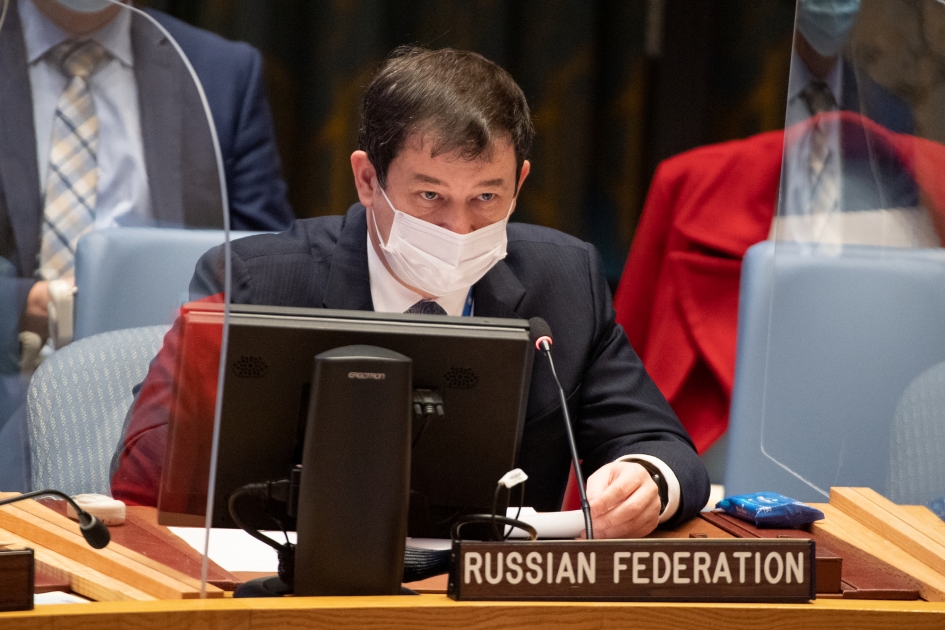Statement by Chargé d'Affaires of the Permanent Mission of Russia to the UN Dmitry Polyanskiy at UNSC briefing on the situation in Colombia
Mme.President,
We welcome the participation of Colombian peace process participant Ms. Luz Marina Giraldo, in a Security Council session. We also welcome Colombia’s Presidential Adviser for Stabilization and Consolidation Mr Emilio José Archila.
We thank Head of UN Verification Mission in Colombia Carlos Ruiz Massieu for presenting the report on the situation in the country and sharing his insights.
The report period was marked by a milestone date – fifth anniversary of the signing of the historic Final Peace Agreement (FPA). We do not cease to repeat that this document put an end to the prolonged half-century-long internal armed conflict, and also granted support of the international community – Secretary-General and the Security Council – to the peace process. Thus the long-suffering people of Colombia got a good chance of step-by-step post-conflict recovery.
The visit of Secretary-General Guterres to Colombia at the end of last year was another manifestation of the international support for the FPA. As a good guest, the Secretary-General emphasized the achievements of those five years, however Security Council members realize that the main bulk of work related to implementation of government’s obligations still lies ahead. The report of the Secretary-General also implies this conclusion.
Issues that have been traditionally considered problematic are: safety of civilians, including rights advocates and peace process participants, their economic, political, and legal reintegration, as well as land reform and crop substitution programs.
Of course, security-related issues appear to be the most urgent. Over the report period, attacks by illegal armed formations made further 12 thousand people leave places of their permanent residence. Last year alone there were 56 mass murders that killed 222 people. Since the signing of the Final Peace Agreement, 303 peace process participants who previously laid down arms have been killed. Do you think the responsible for those atrocious crimes were held accountable?
What we find rather worrisome is that according to the report out of 13 thousand people implicated in cases of the Special Jurisdiction for Peace, three quarters are former combatants from FARC, and only one quarter are employees of state enforcement bodies.
Mme.President,
The sum of those unresolved issues only lets us give a moderate assessment to the results of past five years of implementing the FPA.
At the same time, we admit that there is certain progress at a number of peacebuilding tracks. In this context, we express our full support for the UN Verification Mission in Colombia, and for guarantors to the Agreement – Cuba and Norway.
It is hard to disagree with the conclusions of the SG report saying that the progress of peacebuilding in Colombia is still at risk. As one of the key problems, the Secretary-General cites the deep-rooted factors that cause discords in the society. Colombians should not let this out of sight and be mindful that those must be overcome in order to prevent recurrence of a domestic conflict.
As we keep repeating relentlessly, true peace in Colombia cannot be ensured unless all key forces are involved. In this context, we cannot be satisfied with the report’s scarce information about the lack of talks between the government and ‘National Liberation Army’ (ELN).
These Colombian sides should start looking for ways to have dialogue without preconditions on the same grounds as the negotiations with FARC back in the day. It means that the talks must start and proceed regardless of conflict’s modalities – as if there was no conflict at all.
Traditionally, we remind that normalization of relations with the neighboring Venezuela could promote achievement of lasting peace and stability in Colombia. Among other things, it is needed to combat the outrage of crime in the border areas and serve as a safeguard against confusions and provocations that might have rather dangerous consequences.
Mme.President,
In conclusion, let me make a point about Colombia’s pending elections this year (parliamentary in March and presidential in May). The preparations are underway, which provides a backdrop for the SG report. We have taken notice of the report’s information that some political actors included the topic of implementing the Final Peace Agreement in their electoral platforms. Yet this is not enough. The United Nations needs to send a signal to all political forces participating in the electoral race about the need to strictly uphold this historic document.
By all means, Colombians should exercise their democratic right to elect their leaders by themselves and without external interference. However, we call upon the potential candidates who will seek to take leading state positions to not forget that the global community will form its opinion of them, judging by whether their approach to the peacebuilding program is going to be enough serious and realistic. This is their main responsibility to the Colombian society.
It must be imperative for any government to implement strictly its obligations under the FPA. Substitution of the Agreement with some sort of unilateral programs that are not endorsed by all participants of the peace process can backlash with most negative long-term consequences.
As a Permanent Member of the Security Council, Russia will keep supporting Colombian peace process in order to make it sustainable and irreversible.
Thank you.
